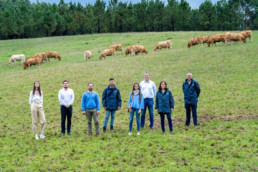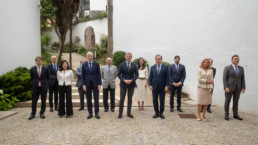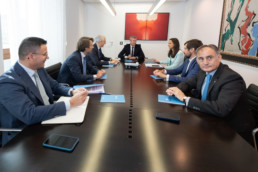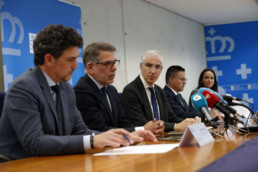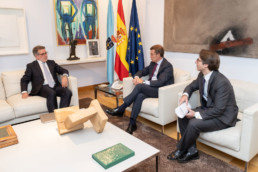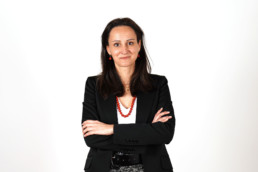Reganosa, Repsol and Naturgy collaborate with Impulsa Galicia in the promotion of a project to transform surplus slurry and other waste into biomethane and organic fertilizers
In an initial phase, once the required administrative authorizations have been obtained, the three energy companies would invest 146 million euros to generate 300 GWh of renewable energy annually with 1.2 million tons of livestock manure
The first production plant of this programme is planned in Meirama, with five pre-treatment centres associated
The initiative would make it possible to reduce external energy dependence and develop the circular economy in the autonomous community. In its full deployment, it would avoid the emission of 500,000 tons of CO2 equivalent per year and up to 600 direct and 1,900 indirect jobs would be created
The companies thus contribute to decarbonising Galician transport, industry and agri-food activity
The project has been presented to four central government ministries with the aim of fitting it into Next Generation funds
28 September 2022
Reganosa, Repsol and Naturgy collaborate with Impulsa Galicia to develop the circular economy with a project that would transform surplus livestock manure and other waste on a large scale into biomethane, organic fertilizers and CO2 neutral of biological origin. This initiative has been designed to optimise slurry management in the autonomous community, reduce energy dependence on the outside, facilitate compliance with new European standards and help decarbonise industry, households and mobility. The promoters are currently carrying out fieldwork and trials that give continuity to months of previous studies and research.
The project consists of progressively deploying throughout the territory a network of plants that value surpluses of bovine, porcine and poultry slurries mixed with a smaller amount of FORS (organic fraction of separate collection) and RIO (organic industrial waste) of the agri-food sector for the production of renewable energy. This is reflected in the memorandum of understanding that Reganosa, Repsol and Naturgy have recently signed with Impulsa, the mixed society promoted by the Xunta de Galicia with the aim of accompanying business initiatives that affect the dynamization, progress and transformation of the Galician economy through a green and digital model.
In an initial phase, the three energy companies plan to build a first anaerobic digestion plant that produces renewable gas and five pre-treatment plants associated with it to dehydrate the surplus bovine slurry. The renewable gas generation plant would be located in Meirama (Cerceda), a fair transition zone, while the five pretreatment plants would be divided, in a first phase, by municipalities in the same province of Coruña and Lugo, according to a distribution based on the Galician map of livestock farms, thus optimizing logistics between both types of facilities.
With an investment of approximately 146 million euros, in this first phase, 1,240,000 tons of surplus slurry would be treated annually and, in addition to organic fertilizers and CO2 neutral, about 300 gigawatts per hour (GWh) of biomethane would be produced and injected into the natural gas network. This renewable gas would be used to decarbonize different sectors, such as transport, residential and industrial, and could be used in the processes of the Repsol refinery in A Coruña.
Extension to all Galicia
Once this initial phase has been completed, the promoters intend to extend the circular economy project in the future to the whole of Galicia, implementing a centralised network for the treatment of surplus livestock manure. This system will ensure the availability to livestock farmers of the slurry necessary to sustainably fertilise their land, as well as the economic viability of their farms. The developers' calculations show that around 6 million tonnes of waste could be recovered each year. Rounding off, the biomethane produced (1 TWh per year) would be equivalent to 7% of the natural gas imports that are now demanded in Galicia, with which the community would substantially advance in its energy autonomy and in the consumption of renewables. The project has been submitted to four ministries of the central Government (Economy, Ecological Transition, Agriculture and Industry) with the aim of fitting it into the Next Generation funds, both for its circularity component and for the fact that it provides a green and indigenous energy source from the surplus of livestock manure.
In this way, the global project would also avoid the emission into the atmosphere of about 500,000 tons of CO2 per year and create quality jobs in the context of the ecological transition and in sparsely populated areas. In short, just over 600 direct and 1,900 indirect jobs, considering both the operation of the plants and transport logistics.
The implementation of this initiative would contribute to compliance with the new European environmental legislation on the protection of agricultural soil and effluent control, as well as sustainable nutrition of agricultural soil, and would address recurrent issues in slurry management and storage.
Innovative for its concept of global integration in the face of dispersion, this project exemplifies at the same time the new model of public-private cooperation and between companies in the same sector, being open to the participation of other companies.
"The parties involved in this project have worked very intensively to provide a solvent technical solution; now we need to create the regulatory framework that allows us to develop and implement the advances," said Reganosa CEO Emilio Bruquetas, who calls for policies that encourage "in a clear way" the production of biogas in Spain.
The director of Renewable Fuels of Repsol, Berta Cabello, for her part, has indicated that "with this project, strategic for Repsol, we promote the reduction of greenhouse gas emissions from transport and industry, we increase the energy autonomy used renewable gases obtained with local resources and at the same time we promote the circular economy and the sustainability of such an important sector in our country as livestock".
The general director of Renewables, New Businesses and Innovation of Naturgy, Jorge Barredo, stressed that "this biomethane production project will boost the energy transition in Galicia and promote sustainable waste management, taking a step forward towards the circular economy and local socio-economic development, in addition to contributing to reduce energy dependence from abroad".
“This,” said Impulsa CEO Enyd López, “is a very relevant project for Galicia. In its conception and support, the Xunta has advanced twofold: on the one hand, favouring an agile decarbonisation of the economy, and on the other, making it easier for livestock farmers to comply with the regulations that will come from Europe. “And she added: "In addition to promoting the circular economy in isolation, this initiative will help generate an ecosystem of solid projects within the Pole for the Transformation of Galicia."
The Xunta highlights that the As Pontes hydrogen plant project describes what is a fair energy transition for Galicia
The first Vice-president and Regional Minister of Economy, Industry and Innovation, Francisco Conde, attended this morning in As Pontes the presentation of the project in which Reganosa and EDP Renovables foresee an investment of 155M€.
The first Vice-president and Regional Minister of Economy, Industry and Innovation, Francisco Conde, stressed today that the As Pontes hydrogen plant project describes what is a fair energy transition for Galicia. "It is a strategic project to address the process of reindustrialisation of the area", he said and highlighted the institutional collaboration between the Xunta and the City Council - with the confidence that the Government will also join in - together with the collaboration with the business community.
The first Vice-president attended this morning the presentation of this project promoted by Reganosa and EDP Renovables, which foresees an initial investment of €130 million which, adding the different necessary connections, could reach €155 million and have the first phases in operation in 2025.
Conde stressed that the hydrogen plant will allow technological developments to be linked to industrial processes to generate a positive impact on job creation and opportunities. Thus, he advanced that the technological partner of the Reganosa and EDP Renovables project, Siemens Energy, will assemble the electrolysers at the Navantia turbine factory.
As he stressed, the project is part of Galicia's Energy Agenda 2030, in which one of the objectives is the development of renewable energies - Galicia is currently the second largest generator of this type of energy - both traditional and new technologies such as offshore wind or green hydrogen.
Conde explained that the companies have been working for more than two years on this "mature and innovative" project. It was presented to the PERTE* for renewable energy and requested to be declared by the Galician Administration as a strategic industrial project, which would allow greater agility by having a single file to carry out the administrative processing, sectoral analysis and obtaining the necessary licenses. Conde stressed that the presence of this plant is in addition to other industrial projects in the region that will allow its reindustrialisation.
Rueda highlights the value of the collaboration between the Xunta and the Impulsa Galicia Company to face the challenges of the next generations
He requests the commitment of the central government to ensure that these strategic initiatives for Galicia can be implemented as soon as possible.
The head of the Galician Government, Alfonso Rueda, today highlighted the collaboration between the Xunta de Galicia and the Impulsa Galicia Company to face the challenges of the next generations.
In a meeting with the Board of Directors of the entity, the President of the Xunta highlighted the value of the experts' proposals to advance in projects of importance for the country, such as the Galician Transformation Hub.
Alfonso Rueda stressed that the Impulsa Galicia Company was launched in the midst of the pandemic as a forum for public-private collaboration. A company that was born from the proposal made by the Committee of Experts promoted by the Xunta "to draw the way forward" and to which the Galician President thanked "its excellent vision" to face the challenges of the Galicia of 2030, "the one we want to leave to the next generations".
Rueda also stressed the importance of public-private collaboration to boost the growth and consolidation of Galicia's business fabric. "What we need for Galicia are good ideas and good projects", and he gave as an example those that led to the creation of the Galician Transformation Hub, "with national and international companies of recognised prestige".
The head of the Xunta de Galicia insisted on the need for the central government to specify the distribution of aid so that projects that are essential for the economic and industrial development of Galicia are not left out of the PERTE.
Impulsa Galicia presents to the President of the Xunta the main projects it is working on
Rueda requests the commitment of the central government so that these strategic initiatives for Galicia can materialise as soon as possible
The President of the Xunta de Galicia, Alfonso Rueda, held a meeting this morning with the technical committee of the Impulsa Galicia Company, in which the main projects on which Galicia is already working to attract European Next Generation funds were evaluated.
Thus, the Altri sustainable textile fibre factory project is included within the Galician Transformation Hub promoted by the Xunta with the help of the Impulsa Company - in which Abanca, Sogama and Reganosa also participate -. This will be an important milestone in the industrial transformation of Galicia, with an investment of 800 M€ and 2,500 direct and indirect jobs.
As highlighted at the meeting, two other projects integrated in the Hub revolve around this initiative, which serve as a source of energy for the planned factory in Palas de Rei (Lugo): the development of a biomethane production plant from slurry and the development of a green hydrogen centre.
In addition, Rueda highlighted during the meeting that the different projects included in the Galician Transformation Hub are of a strategic nature and have a great capacity of traction on the Galician business fabric, which ensures growth, employment and competitiveness, responding to the challenges that the current context requires from the economic, environmental and social point of view.
For this reason, he stressed, it is hoped that in the framework of the necessary collaboration between administrations, the central government will demonstrate its commitment through the Next Generation funds. Therefore, the Xunta de Galicia is waiting for the President of the Government, Pedro Sánchez, to respond to the request for a meeting as requested by the President of the Galician Executive in view of the need to speed up and decentralise European funds, with the aim of these strategic projects materialising as soon as possible, benefiting above all small and medium-sized enterprises.
The Impulsa Company is a public-private mechanism in which the regional government (40%), Abanca (38%), Reganosa (12%) and Sogama (10%) participate. This company is responsible for accelerating the development of new business projects, such as this textile fibre factory, which contribute to generating economic activity and value chains from which small and medium-sized Galician companies in particular can benefit.
The forestry sector learns about Altri’s textile fibre factory project at a conference organised by Impulsa Galicia
The Xunta assures that the textile fibre factory will be a boost for the digitalisation of the forestry industry and new uses of wood.
The Galician government guarantees maximum administrative flexibility as it considers this initiative a strategic industrial project.
The Xunta has announced its intention to hold a new meeting with the central government to identify the instruments, within the European funds, in which this project can fit.
4 May 2022
The Vice-President for Economy and Acting Regional Minister of Economy, Enterprise and Innovation, Francisco Conde, and the Acting Regional Minister of Rural Affairs, José González, together with the CEO of Altri, Jose Sonar, and the general manager of the company Impulsa Galicia, Enyd López, held a meeting this morning in the Cidade da Cultura with the Galician forestry sector about the textile fibre factory project.
In his speech, Conde assured that the textile fibre factory would be a boost for the forestry industry, both from the point of view of the new uses in wood, as well as the digitalisation of the sector and progress in eco-innovation and eco-design. He also highlighted the capacity of this initiative to generate quality employment and attract both new industries and investments in the forestry and textile sectors. In this regard, Altri foresees the creation of more than 2,500 direct and indirect jobs and an investment of 800 million euros.
The Acting Vice-President for Economy pointed out that what matters now is the development of a joint work of all the administrations so that the factory generates the desired impact. Thus, he explained that for the Xunta it will be a strategic industrial project, which will allow its processing to be more agile, which will help to reduce the processing times by half, while maintaining all legal, technical and environmental guarantees.
Conde also recalled that the central government is aware of this project, as it is one of those that Galicia selected and presented as a priority, as requested by the state government. He advanced the intention of the Xunta to hold a new meeting with the central government to update the status of the project and identify the instruments, within the European funds, that would allow is implementation.
Conde thanked Altri for its confidence and commitment to establish itself in Galicia and stressed that it is a project will generate value throughout the forest-industry chain. The meeting evaluated the impact of the factory on the Galician forestry sector, which produces 10 million cubic metres of industrial wood; and explained the tools available to the Galician government to ensure the diversity of forest resources such as the Galician Forest Plan or the preparation of the permanent forest inventory.
This project will provide an important boost for the rural environment and for the sustainable management of Galicia’s forests and forestry.
The Xunta sees the textile fibre factory as a project that will contribute to industrial transformation by creating value throughout the forestry chain in Lugo and Galicia
The Vice-President for Economy and Acting Regional Minister of Economy, Enterprise and Innovation, Francisco Conde, the Acting Regional Minister of Rural Affairs, José González, and the Regional Delegate of the Xunta in Lugo, Javier Arias, participated this morning in an informative meeting with the CEO of Altri, Jose Sonar, and the general manager of the company Impulsa Galicia, Enyd López.
The Galician government guarantees maximum administrative flexibility as it considers this initiative a strategic industrial project.
Conde stresses that this factory fits into the industrial-sustainability binomial and exemplifies the commitment to public-private collaboration.
3 May 2022
The Vice-President for Economy and Acting Regional Minister of Economy, Enterprise and Innovation, Francisco Conde, the Acting Regional Minister of Rural Affairs, José González, and the Regional Delegate of the Xunta in Lugo, Javier Arias, participated in an informative meeting with the CEO of Altri, Jose Sonar, and the general manager of the company Impulsa Galicia, Enyd López, celebrated this morning in Lugo, on the Palas de Rei textile factory project.
The Galician government considers that this project will contribute to industrial transformation by creating value throughout the Galician forestry chain, through an investment of 800 million euros and the forecast creation of more than 2500 direct and indirect jobs.
Conde stressed that this factory fits into the industrial-sustainability binomial because it meets the criteria set by the European Commission for the development of a green economy, and exemplifies the commitment to public-private collaboration to carry out the major projects with which Galicia aspires to European funds. In this regard, he reiterated the need for the central government to be committed, as this is an opportunity in which all administrations must do their part.
The Acting Vice-President for Economy explained that the Xunta has given Altri the utmost confidence to bet on establishing itself in Galicia, considering the industrial project to be strategic, in order to ensure administrative agility.
For his part, the Acting Regional Minister for the Rural Environment, José González, stressed that this initiative “has no equal anywhere else in the world”, by the fact of closing the production cycle and also do so with closeness to the resource, i.e. the wood.
González defined the project as a “success story” of public-private collaboration and recalled that it was configured from the outset as a sustainable forest management initiative, starting from a resource of Galicia’s own, “very important in this province”, such as wood. In this respect, he pointed out that our region accounts for half of all timber harvests in Spain, with 10 million cubic metres last year, and that we have “great potential for growth”, because the figure for 2015 was 7.6 million.
In addition, the head of the Rural Environment Department described the project as “clearly bankable” within the framework of the Next Generation funds, because it meets two fundamental requirements, such as sustainability and circular economy. Besides, the regional minister linked this initiative with the development of the Galician Forestry Plan 2021 – 2040, in the sense that it represents a “clear commitment to the certification of our forests”. A certification that, he added, in the Galician case is led by environmental organisations “that are accrediting that in Galicia there is a multifunctional, biodiverse and orderly forest”.
At the meeting, it was explained that the location of the factory was carried out from a technical evaluation process in which 46 possible sites were studied taking into account various criteria such as the availability of a sufficient and constant water resource; the availability of 150 hectares of land; the flat orography with the possibility of expansion; compatibility with urban, heritage and environmental regulations; proximity to wood and to energy and transport infrastructures, as well as the distance to population centres.
This project will be an important boost for the rural environment and for the sustainable management of Galicia’s forest and forestry.
Altri informs the President of the Xunta de Galicia that it chooses Palas de Rei as the best possible location for the complex of textile fibres
Feijóo stresses that this decision, the result of an exhaustive technical analysis by the company, is a fundamental step forward in this project, thus complying with the request made unanimously by the Galician Parliament for the factory to be located in the province of Lugo.
The development of this initiative would involve an investment of 800 million euros and the creation of 2,500 direct and indirect jobs.
The President stresses the need to close this project, being not only a candidate but also a successful recipient of European funds: “We need the central government to close this circle and commit to the material and efficient execution of the funds, according to the regulations of the same”, he emphasises.
26 April 2022
After a meeting with the CEO of the company, Jose Soares de Pina, the President of the Xunta de Galicia, Alberto Núñez Feijóo, stated that this decision, the result of an exhaustive technical analysis by Altri, is a fundamental step forward in this project, thus complying also, with the request made unanimously by the Galician Parliament for the factory to be located in the province of Lugo.
“We are talking about an investment of just over 800 million euros and the creation of 2,500 direct and indirect jobs,” he said, stressing the enormous importance of this plant for Galicia, becoming the only textile fibre factory in Spain.
During his speech, the President of the Xunta recalled that this is a new project that has been “desired and worked for” for a long time and emphasised the need to close this project, being not only a candidate but also a successful recipient of European funds. ““We need the central government to close this circle and commit to the material and efficient execution of the funds, according to the regulations of the same”, he added.
In this regard, he affirmed that the regional administration, within its area of competence, would continue to be committed and to work to advance in all phases of its development.
The head of the Galician government concluded by thanking Altri for the decision to invest in Galicia, with a project through which the region aims to make up 3% of the world production of sustainable fibre.
Miguel Corgos joins the board of Impulsa Galicia
Miguel Corgos López-Prado, Treasurer and Minister of Public Administration for the Xunta de Galicia, has joined the board of Impulsa Galicia, the Galician Association for the Development of Strategic Projects. Corgos will represent the regional government, replacing the previous treasurer, Valeriano Martínez García.
Impulsa’s board is led by Francisco Conde, the Xunta’s Vice President of the Economy. His second in command is the managing director of Abanca, Francisco Botas. Other members of the board include the Xunta’s Minister for Rural Affairs José González; Emilio Bruquetas, the CEO of Reganosa; José Eduardo Álvarez-Naveiro the director of corporate governance and legal affairs at Abanca; and Abanca’s head of legal advice Eduardo Cortizo. Independent advisors include the former president of the Xunta and current professor of Applied Economics at the University of A Coruña, Fernando González Laxe; Santiago Lago Penas, a professor of Applied Economics at the University of Vigo; Amparo Alonso Betanzos, the president of the Spanish Association of Artificial Intelligence; and the vice governor of the Council of Europe Development Bank, Rosa María Sánchez-Yebra.
The board met in Santiago to discuss the development status of each of the projects that the organisation is working on, in addition to looking at other potential opportunities.
The organisation
With 5 million euros of founding capital behind it, Impulsa was established in April 2021 as a joint venture between the Xunta de Galicia (40%), Abanca (38%), Reganosa (12%), and Sogama (10%). The entity has been entrusted with developing business initiatives with the tractor effect that will support the development, progress, and transformation of the Galician economy by using a digital and green model. It was born out of the objective to incentivise productive activity among the community by attracting investment, forging partnerships, and fostering collaboration between public and private institutions with a view to launch and consolidate new businesses ideas.
Above all, Impulsa’s objective is to support and expand the reach of the Pole for the Transformation of Galicia, an initiative from the Xunta de Galicia that forms part of the strategy for applying for access to NextGenerationEU funding. It also aims to follow the principles of circularity and sustainability, as well as being ‘green’, digital, inclusive, generating wealth in the local community, and combining the interests of approximately thirty SMEs as well as those of larger companies.
The organisation charged with making strategic initiatives viable in Galicia chooses an industry leader to navigate the next phases of the project that will transform timber into sustainable textile fibre
Impulsa Galicia (the Galician Association for the Development of Strategic Projects) has secured an investor and technologist for one of their “tractor effect” initiatives. The evolution of the project, which will turn timber into textile fibre, is thanks to a great deal of development work over the last few months. A deal with Altri will be signed to guarantee the manufacture of 200,000 tonnes of sustainable textile fibres annually in Galicia, using timber sourced from Galician forests as well as recycled textiles.
The global search for a technologist involved a fair, homogenous selection process that was based on technical, operational, and strategic criteria. The chosen industry leader will fund the design and development of the project until investment is secured, as well as explore potential alliances within the Galician forestry value chain. Impulsa will work with Altri to complete the required administrative tasks as well as to find potential locations suitable for the project.
Total disbursement for the project is expected to be 800 million euros, with one of the main goals of the initiative being to build a factory that manufactures lyocell, a type of sustainable fibre that can be turned into thread, fabric, and clothing. It would be produced using timber sourced from Galician forests in addition to textile recycling. The operation, maintenance, and logistics of the project in its entirety will result in 1,500 direct jobs and more than 6,500 indirect jobs, while the factory’s construction will employ an additional 1,700 people.
The plan adheres to the principles of circularity, sustainability, and innovation, and putting it into motion will highlight the value of the region, contribute to rural recovery, promote the use of certified timber, make use of some of the most environmentally friendly technology available, close the forestry production cycle in Galicia, and provide a solution to the growing demand for sustainable, high-quality, locally made textile fibres.
“We have developed an innovative idea, turned it into a project with the tractor effect, and found a technologist and investor that will allow it to continue to prosper. Everything that this organisation was created for is exemplified in this plan for sustainable management of Galicia’s forests,” explains Enyd López. She adds “We are very happy that we have found a good partner and have been able to clearly articulate what lies ahead for this local project, a result of the collaboration between the public and private sectors that promotes a core activity for the Galician economy. We are just getting started with this inclusive project [and it is] open to collaboration with the Galician forestry sector, especially SMEs and the value chain which, just like the process itself, will be digitalised and apply the principles of sustainable mobility. We hope that this initiative will have a multiplier effect, ultimately resulting in sustainable employment opportunities in the long term”.
The organisation
With 5 million euros of founding capital behind it, Impulsa was established in April 2021 as a joint venture between the Xunta de Galicia (40%), Abanca (38%), Reganosa (12%), and Sogama (10%). The entity has been entrusted with developing business initiatives with the tractor effect that will support the development, progress, and transformation of the Galician economy by using a digital and green model. It was born out of the objective to incentivise productive activity among the community by attracting investment, forging partnerships, and fostering collaboration between public and private institutions with a view to launch and consolidate new businesses ideas.
Above all, Impulsa’s objective is to support and expand the reach of the Pole for the Transformation of Galicia, an initiative from the Xunta de Galicia that forms part of the strategy for applying for access to NextGenerationEU funding. It also aims to follow the principles of circularity and sustainability, as well as being ‘green’, digital, inclusive, generating wealth in the local community, and combining the interests of approximately thirty SMEs as well as those of larger companies.
Expert in circular economy to lead Impulsa Galicia, a public-private entity established to help develop strategic projects in Galicia
Two others will also work alongside Enyd López on the organisation’s board of directors: Amparo Alonso, an expert in artificial intelligence, and Rosa María Sánchez-Yebra, the vice-governor of the Council of Europe Development Bank.
Santiago de Compostela
July 12, 2021
Enyd López Fernández, a chemical engineer who holds a degree in chemistry from the University of Santiago and who is also an expert in circular economy, is the new head of Impulsa Galicia, the Galician Association for the Development of Strategic Projects. The organisation is a joint venture that was established in April by the Xunta, Abanca, Reganosa, and Sogama with the goal of modernising Galicia’s economy by applying the fair, green, and digital transition model. Its main objective is to help develop strategic initiatives for Galicia. Amparo Alonso Betanzos, an expert in artificial intelligence, and Rosa María Sánchez-Yebra, who specialises in fiscal policy, will also join the organisation’s board of directors.
Enyd López was chosen by the board to be managing director of the organisation. Until recently, López was the head of Galicia Saica Natur, a part of Grupo Saica that focuses on the circular economy and waste management. She has also led several teams, divisions, and delegations for Grupo Saica throughout Spain.
Two more women have also been appointed to the board. Amparo Alonso is a professor of Computer Science at the University of A Coruña, as well as the president of the Spanish Association of Artificial Intelligence and a member of the Artificial Intelligence Advisory Council.
Rosa María Sánchez-Yebra is the vice governor of the Council of Europe Development Bank. She has also sat on the boards of the Banco de España and the National Securities Market Commission and was the secretary-general of the Spanish Treasury and Department of Fiscal Policy.



